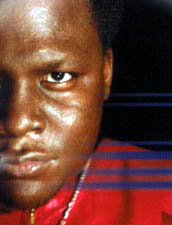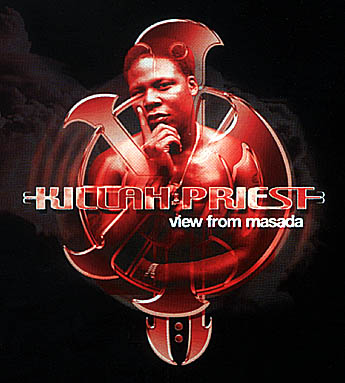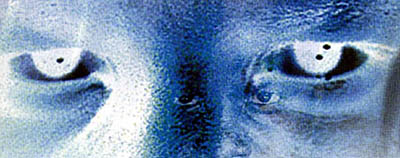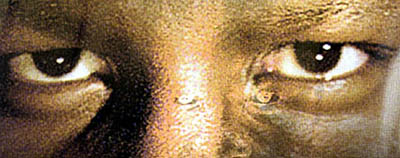Advertisement:

Killah Priest aka Masada:
View from Masada
 "The pressure that comes with being an artist can be overwhelming.
Some cave in when attempting to live up to their early achievements.
Others, like Killah Priest, keep elevating." On View From Masada, the Wu-Tang Clan affiliate's second stellar solo album (including a MPEG), Priest improves upon the lyrically dense mastery of Heavy Mental, his 1998 debut album. Masada, Priest's new alias, stands for
"Mostly Analyzing Situations And Drama Artistically." This acronym aptly describes Priest's analytical approach to
music making. View from Masada is executive produced by K. Thomas (Big Kev) and Killah Priest himself aka Masada. Priest combines his witty
lyrics with potent club-ready beats. He says: "Killah Priest gave cats that like beats, beats. Killah Priest
gave cats that like lyrics, lyrics. It's all put together right." "The pressure that comes with being an artist can be overwhelming.
Some cave in when attempting to live up to their early achievements.
Others, like Killah Priest, keep elevating." On View From Masada, the Wu-Tang Clan affiliate's second stellar solo album (including a MPEG), Priest improves upon the lyrically dense mastery of Heavy Mental, his 1998 debut album. Masada, Priest's new alias, stands for
"Mostly Analyzing Situations And Drama Artistically." This acronym aptly describes Priest's analytical approach to
music making. View from Masada is executive produced by K. Thomas (Big Kev) and Killah Priest himself aka Masada. Priest combines his witty
lyrics with potent club-ready beats. He says: "Killah Priest gave cats that like beats, beats. Killah Priest
gave cats that like lyrics, lyrics. It's all put together right."
A view which Killah Priest has about the life in his 'chaotic'
World. His words, on Maccobean Revolt a really dope track from the Wu banga with an in advance same
named interlude which you should hear at the nearest RnB club
in your area.
Masada
Masada was a Jewish village where the people refused to live under Roman law. Last stand against the Romans after the fall of Jerusalem
in Ad 70. Roman conquered the village in the end of a long stand
out, but couldn't capture it’s people, they all committed suicide.
So their souls would remain free. These days the ruins are used
to take the oath from new Israel's soldiers. "Masada will never fall again."

Lyrics from Hard Times:
"We go from hard times to part-time
from part-time back to hard times
That's the start of crime
Till the day we see the father shine
Light on us trying to warn us
We play the corners"
Killah Priest writes his lyrics drama deep, with many details
in it. So often, the story becomes to lethargic.
Tell the world
"I was real open-minded and ready to work," Priest says of his mindset heading into the album. "I felt like I had a lot of creative thoughts that I really wanted
to put down on this one. It's more controlled. I knew what I wanted
to do and I knew I was going to elevate." That's an understatement. Throughout the 17 songs on View From
Masada, Priest delivers a potent batch of exciting, detailed story
rhymes that come off like classic literature. On Last Supper, for example, Priest recounts the tale of Christ's final meal, updating the tale of betrayal and adding a thug-like
dimension to the timeless story.

With When Will We Learn, Priest calls for people to better themselves and to stop repeating
the devastating, self-destructing behavior that cripples many
communities. "That's a song that I've been holding deep down inside for a long
time," he says. "We've all got to change. I've seen a lot people go, a lot of
my friends get killed. You see the younger cipher coming up and
they do the same thing. It's like a never-ending cycle." These songs exemplify Priest's musical mission, highlighting
both his story telling prowess and demonstrating that his songs
have important messages. "When you're an artist, you've got a chance to be a prophet, to
tell the world what's really going on," Priest explains. "You can tell the world what's happening in the ghetto and the
ghetto what's happening in the world. You're like a mediator between
two worlds. It's important that you say something of substance.
I wouldn't do this if I didn't have anything to say."
Saying exactly what I feel
Elsewhere, Priest combines his witty lyrics with potent club-ready
beats. The riveting title track is a perfect example. Priest allows
the listener to get into his mind while forcing them to the dance
floor. The same can be said for party-starting I'm With That, produced by Shamello (Busta Rhymes' "Put Your Hands Where My Eyes Can See"). "I'm saying exactly what I feel in the way that I want to say
it," Priest says of his lyrics. "Not saying that I didn't say it before, but this time it's just
me in the studio. I didn't write all my rhymes at the house. I
listened to the tracks and I'd go in the studio and just zone
out for hours."

I gave cats that like lyrics, lyrics.
Priest came of age in Brooklyn. Even though he was surrounded by poverty, he always felt that
he was rich inside. He loved life and dedicated himself to discovering
why his people suffered like they do. This quest led him to study
sessions, as well as microphone sessions with the Wu-Tang Clan's
GZA/Genius, who was sprinkling lessons from the 5% Nation Of Islam into his high-octane raps. After being invited into the studio
by the GZA and meeting Method Man and Ghostface Killah, Killah Priest became a member of the Wu-Tang Clan's extended
rhyme family. He jumped on tracks that would appear on the GZA's
Liquid Swords album, among others. Priest also linked up with fellow rappers
Prodigal Sunn, Hell Razah and 60 Second Assassin to form Sunz Of Man. Also, after being approached with the idea by Canibus, Priest helped co-found the Four Horseman, a group the two heavy hitting MCs formed with equally gifted
rhymer Kurupt and Ras Kass. After sitting back, watching and learning about the record industry,
Priest is poised to return with the masterful View From Masada.
By reading, meditating and growing, Priest prepared himself for
the next chapter in his musical life. "With this album, the impact is going to be incredible," he says. "It's going to hit people. They're going to be shocked, but they
can't front. I gave cats that like beats, beats. I gave cats that
like lyrics, lyrics. It's all put together right, right."
Note to the Wu- fanatics: Wu Tangs new album is coming up: 'The Worms in the Big Apple' produced by RZA (of course) with old- 36 chambers as new Wu-soundings.
KP Homesite: http://www.killah-priest.com
Herbz

© 2000 ART12/VanderHoek Publishing. All rights reserved.
|

